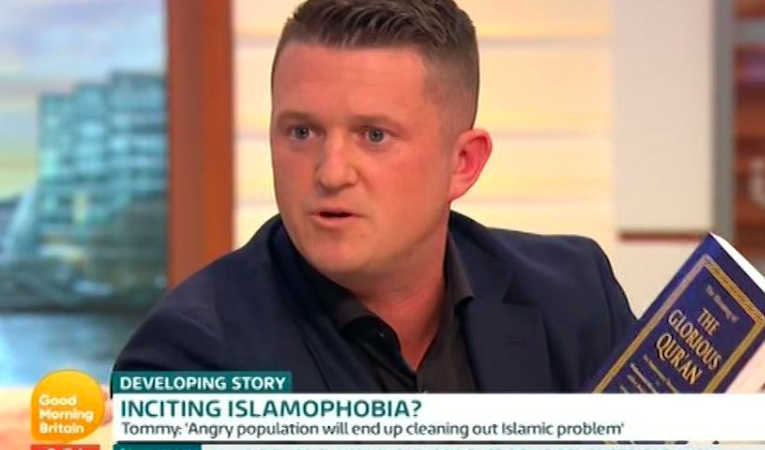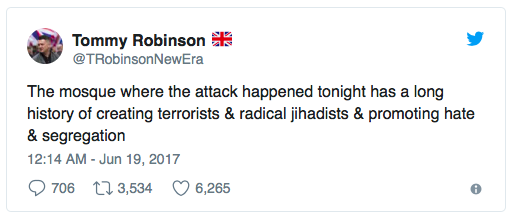76 per cent of the British public think Facebook and Twitter aren't doing enough to curb extremist content on their platforms.

Extremist, anti-Muslim messages are growing online according to a new report by Hope Not Hate – the social media presence of anti-Muslim individuals and groups has grown by over 100 per cent this year alone, they claim.
Monitoring ‘key anti-Muslim social media accounts’, Hope Not Hate say that Twitter bots, fake news and image manipulation are helping anti-Muslim activists spread their message online.
And their numbers seem to back it up.
Looking at prominent anti-Muslim social media accounts, the group found that, for example, former head of the English Defence League Tommy Robinson saw his Twitter following increase 17 per cent in the days after the Manchester arena bombing.
Robinson gained 29,396 new followers in the 48 hours after the attack.
After accusing the Finsbury Park Mosque of ‘creating terrorists’ on Twitter following an attack outside the place of worship, Robinson gained 22,365 followers in the space of a few days.
The campaign group also found that tweets by one of the world’s most prominent anti-Muslim figures, Pamela Geller, are spread by 102 ‘bots’ – accounts that automatically retweet content put out by Geller.
There was a 117% growth in followers for key anti-Muslim activists in the UK and USA between March to November 2017, the report by the group claims.
Hope not Hate said: “The global reach, low price and lack of regulation on these platforms clearly present new possibilities for independent, single issue and extremist viewpoints to gain significant audiences.
“It is time that social media companies woke up to this fact and did more about the spread of fake news.”
At the same time, the majority of the public think that social media companies aren’t doing enough to vet extremist content online.
76 per cent of respondents to a new Demos-Opinium poll said they thought Twitter, Facebook and other companies weren’t devoting enough resources to removing extremist content.
89 per cent of people said they were concerned about extremists using digital platforms and 70 per cent of people said they were concerned about online abuse.
67 per cent of people said they were concerned about the spread of fake news on social media.
Companies such as Twitter and Facebook have a responsibility for the hatred fuelled content that is growing on their platforms. It’s clear they urgently need to invest more in tracking and vetting extremist groups.
Left Foot Forward doesn't have the backing of big business or billionaires. We rely on the kind and generous support of ordinary people like you.
You can support hard-hitting journalism that holds the right to account, provides a forum for debate among progressives, and covers the stories the rest of the media ignore. Donate today.






3 Responses to “Extremist content is growing online and the public blame social media companies”
Fred
How telling that you make no mention of Islamic extremism but feature a big picture of Tommy Robinson as though that it what the respondents were primarily referring to.
Here’s a quick recap of the statistics so far this year.
People killed by Islamic terrorism in the UK = 35
People killed by far-right terrorism in the Uk =1
Martyn Wood-Bevan
The majority of the public seem to believe what the MSM tell them to believe. The MSM is under threat from Social Media and their right-wing dominance is starting to collapse, thankfully. Social Media has a much wider coverage and much of it overshadows the MSM when it comes to depth of understanding and accuracy.
Dave Roberts
The statistics quoted by Fred tell it all for the UK. 35-1. No further comment is needed.